 MyDogBreeds
MyDogBreedsCirneco dell'Etna is originated from Italy but Aussie Poo is originated from United States. Cirneco dell'Etna may grow 8 cm / 3 inches shorter than Aussie Poo. Cirneco dell'Etna may weigh 18 kg / 39 pounds lesser than Aussie Poo. Cirneco dell'Etna may live 3 years less than Aussie Poo. Cirneco dell'Etna may have more litter size than Aussie Poo. Both Cirneco dell'Etna and Aussie Poo requires Moderate maintenance.
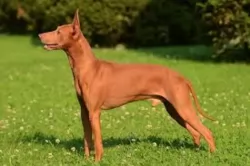 The Cirneco dell’Etna comes from the island of Sicily and not mainland Italy, although it is considered an Italian dog. It is a small dog that hunted rabbits and its calling card was its ability to go for hours without water or food. They have terrific endurance and a good sense of smell. They were developed for the harsh terrain they worked around places like Mount Etna. Of all the Mediterranean island hunting dogs, the Cirneco de’Etna is the smallest.
The Cirneco dell’Etna comes from the island of Sicily and not mainland Italy, although it is considered an Italian dog. It is a small dog that hunted rabbits and its calling card was its ability to go for hours without water or food. They have terrific endurance and a good sense of smell. They were developed for the harsh terrain they worked around places like Mount Etna. Of all the Mediterranean island hunting dogs, the Cirneco de’Etna is the smallest.
This is a very ancient breed, surviving on its hunting skills alone for thousands of years on Sicily. They then became guard dogs for the peasants. Because they had such speed, sense of smell, alertness and sight, they were great hunters.
Today’s Cirneco de’Etna is highly competitive in confirmation and make terrific pets. They are exceedingly friendly, energetic and low maintenance. Lure coursing is what they really excel at. They are good at agility and pursuit games as well.
Aussiepoo is a hybrid breed mix of purebred Poodle and Australian shepherd. If one of the parents is miniature Poodle, the Aussiepoo will be smaller than usual - mini Aussiepoo. We do not know precisely their origin, but we know that this beautiful mix is originating from USA, Australia and Canada.
Breeders can't really know how pups are going to look like until they are born. No one actually can control the combination of the genes. Usually, Aussiepoo is silky-fur playable and friendly dog, and that is always more than enough for Aussiepoo lovers.
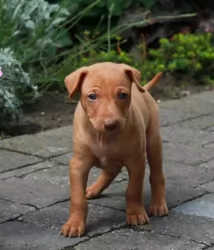 The Cirneco de’Etna is a sleek, muscular sighthound. His ears are close together and high on his head. The head is lean, and the skull is almost flat in profile. The muzzle is about the same length as the skull and the nose is large and its coloring matches the dog’s coat. They have hard pads the same color as their nails, but they are never black.
The Cirneco de’Etna is a sleek, muscular sighthound. His ears are close together and high on his head. The head is lean, and the skull is almost flat in profile. The muzzle is about the same length as the skull and the nose is large and its coloring matches the dog’s coat. They have hard pads the same color as their nails, but they are never black.
Every Aussiepoo depends on the size of the Poodle that was bred. If the parents are smaller than usual, the puppies will be smaller. Their colour also depends on the colour of the parents, and a litter can have puppies of a different colour. Their bodies are usually very muscled, with strong bones, but if you are not an outdoor type, there is a chance that your Aussiepoo will be obese. They are very active and they need a well-balanced diet.
These dogs are easy to train since they are intelligent and people oriented and you can train them while they are still puppies. Aussiepoo is generally friendly with strangers, always ready to play with children and they get along with other pets and animals. This breed is very affectionate and they like their humans to be close so it’s not recommendable to raise them to be loners.
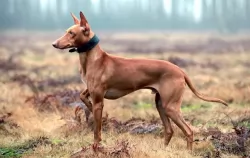 The Cirneco de’Enta is an independent and intelligent breed. They are good-natured and love to be with their people. They are more trainable than the usual sighthound. They are loyal and fun loving but they need a job.
The Cirneco de’Enta is an independent and intelligent breed. They are good-natured and love to be with their people. They are more trainable than the usual sighthound. They are loyal and fun loving but they need a job.
Aussiepoo is a friendly kind. They are always ready to run and play with children, and they will tend to keep the children together (genes of the Australian shepherd). They are so playful that they will see no difference between an infant and a five-year-old, so be present if there are small children unstable to walk alone.
Except the fact that they love water and that they are great swimmers, they have many agility talents.
Since Aussiepoo is a loving, caring and sweet kind of dog, they will fit in anywhere you take them.
They are super friendly with strangers, and that can be an issue if you don’t keep an eye on them. But, they should never be left alone, or leash free outdoors. They are not so good as a guard dog, so if you tend to keep him inside with stay-at-home family member, this breed if no a good choice.
They generally learn quickly. Therefore, they are easy to train. They respond better to the prize training methods.
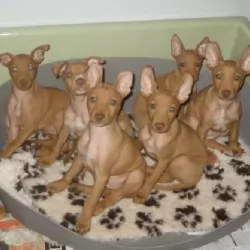 Like many dogs that come from ancient breeds with little cross breeding over the years, there are not a lot of inherited issues for the Cirneco de’Etna. Also, there are so few dogs remaining that little is known about their health in general and there are no studies to go on. Some breeders will do test despite the fact that none are recommended.
Like many dogs that come from ancient breeds with little cross breeding over the years, there are not a lot of inherited issues for the Cirneco de’Etna. Also, there are so few dogs remaining that little is known about their health in general and there are no studies to go on. Some breeders will do test despite the fact that none are recommended.
Their most common health issues are acquired such as injuries from running or competitions and obesity. Both can be controlled by the owner.
Risk of: eye cataracts, hip dysplasia (malformation of the ball and socket joint), epilepsy, progressive retinal atrophy (degeneration of the retina cusing progressive vision loss culminating in blindness), sebaceous sdenitis (an inflammatory skin disease that affects the skin glands), bloat, nasal solar dermatitis (sun sensitivity).
Pelger - Huet syndrome (abnormalities in blood cells. PHA testing is advised with this dog breed. PHA is inherited and dangerous only if both parents carry this abnormality.)
Von Willebrand's Disease (inherited bleeding disorder caused by a deficiency in the amount of a specific protein needed for blood clotting. It can be detected by buccal mucosal screening.)
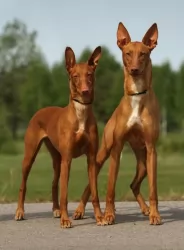 The Cirneco needs a good quality food since they are such high energy dogs. Be careful not to overfeed them so that they become obese.
The Cirneco needs a good quality food since they are such high energy dogs. Be careful not to overfeed them so that they become obese.
As previously mentioned, the main concern for owners is injuries acquired while on a running course or in the activities of daily living. They have been known to hurt their feet. They need their ears checked regularly for any signs of infection or irritation. Clean out any excess water or dirt.
This is an intelligent, hardy breed that needs mental and physical stimulation. They need a job, or they can be a major problem. They love hunting of course but also excel at agility, lure crossing, and competition. He is loyal and loves being with people. Take him for long walks but don’t let him off the leash.
It would be great to establish a feeding routine while the Aussiepoo is still a puppy. The best advice is to feed them three times a day, with the last meal around 5 p.m. After they finish their meal, leave them for a while. Make sure to feed your puppy with high-quality food rich in nutrients, and follow the recommendation of the dosage of the food. Avoid cheap dog food and addition meals.
Once you made a healthy feeding habit and your Aussiepoo is 6 months old, they won’t need three meals per a day. Leave the meal set for the morning and the one set for the evening. Avoiding night meals is a must. Don’t start any activity with the dog right after the meal. Make sure your dog has plenty of fresh water.
Activity, outdoor games, nutritional and balanced meals are the key for an Aussiepoo.
This breed is extremely intelligent. Since they are easy to train, you will be able to take them with you anywhere you go. They love to play in the water, but make sure they are not exposed to the sun for too long. They like smart games, mentally challenging, and they will be very playful with other dogs.